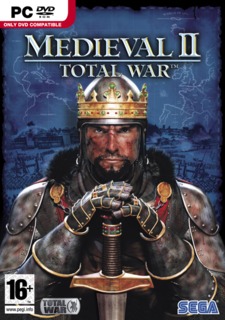A turbulent Europe, and almost perfect game map and refined, consistent battles. What more could you ask from total war?
Europe during the Medieval era, from the dark ages on, was a chaotic land where nations would rise and fall seemingly over night. As the leader of one of many European (or Middle Eastern) nations, it is your job to see to securing your borders, conquering rebel lands, invading your neighbors, thwarting your back stabbing allies, appeasing the pope (should you go catholic), managing your espionage and financing all these endeavors. To say you just build a bigger, better army then fling it at your enemies is inaccurate, at least until you conquer enough land to begin said building and flinging. You have to palsy quite cautiously in the beginning of the game as you never know who will begin to attack your borders.
Gameplay on the world map can be summed up by one simple task made complicated, take the city/castle that controls the region. This isn't easily done without some thought. If you don't scout ahead with spies you can easily be ambushed. Fail to maintain a stable infrastructure and you won't be able to support a large army. When the enemy outnumbers you do you buy mercenaries or retreat an compile forces? Why do merchants suck so much? You control anywhere from one two dozens of armies and regions which you use to attack and defend enemies. Unless you give the army a general (an appointed member of the family) it will be controlled by an inexperience captain who can only be promoted through victory. Conquest brings morality, as you must decide whether to nobly spare your enemy's people by releasing POWs and occupying cities, greedily ransom soldiers and sack cities for loot, or coldly butcher everyone in cold blood. As time progresses your forces are given fancier armors thanks to your nations' innovations and you might even see gunpowder units if you pace yourself.
Subterfuge still won't win you wars, but it has improved. Assassins Start by taking out low ranking officials and diplomats, and develop until they can remove untouchable generals. Spies relay useful information about enemy positions and cities. Priests convert lands held by heretics to your favor, and merchants slowly being you extra money in an economic war. Investing more into specific units gets you offers from guilds to build specialty structures in your cities. There are some drawbacks by this system. Heretics grow like weeds in your lands if you forget to retrain priests after they die of old age, and your priests can fall to heresy or fail to remove them (causing riots). Merchants, which can be expensive at the start of a game, are almost always driven out of business by opponents, leaving you with nothing but a waste. Assassins take a while before they become useful, and by the time they become effective you've probably already conquered your enemies through land grabs. Oh, and there's princesses, but they spawn automatically and are normally married off before they can accomplish more than merely bolstering the royal family.
The map on which you play is a beautiful representation of Europe. Turns change by season, and during winter turns the map is blanketed in white. Mediterranean areas have a gorgeous look and the division in cultural distinctions shows creative Assembly put thought into this game. In battles no two men look alike, making their deaths feel more tragic and real. Cities are towers that loom on the map, and the soldiers that represent your armies are covered in thick steel.
The game does have faults, but the fun found here outweigh them. The previously stated heretic problem begs repeating, as it is not easy trying to snuff out heresy to keep your populations happy. Random rebels also spawn on the map, and offer little more than a chance for your captains to get promoted. Speaking of commanding officers, all generals spawn in one of two places. They either spawn in your capital until they overfill, or the reach 'coming of age' where their fathers spawned. Transferring generals to Jerusalem to fight Mongols isn't easy when your capital is London. Granted you can relocate your capital, but this doesn't solve the problem of clutter. Also, while the battles are fun there came a point where I just auto-resolved every battle.
This game must be played to realize what enjoyment it holds. About the only game I can say I clocked more hours on was it's sequel, Empire (and that was mostly because of the long load times). Reliving historical moments in Medieval Europe has never been as well rendered, and rarely has a strategy game been this well designed.

